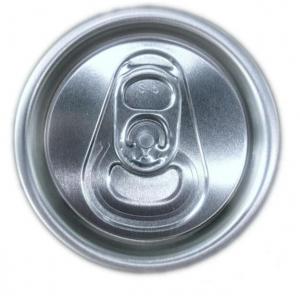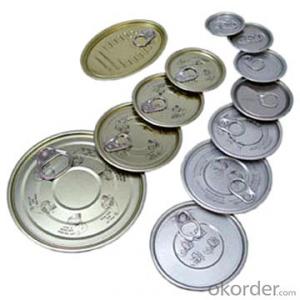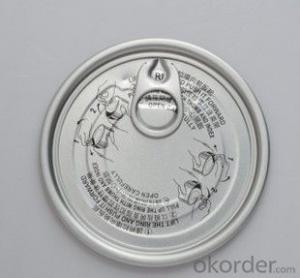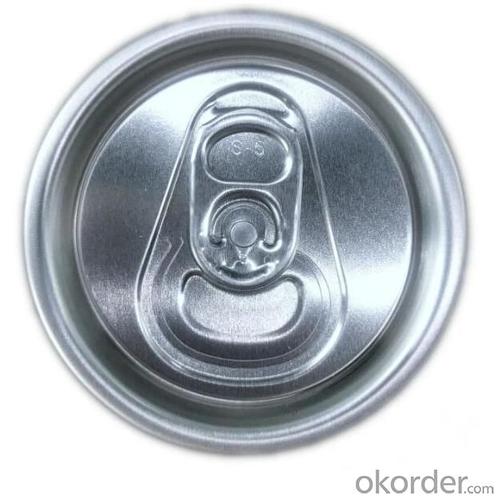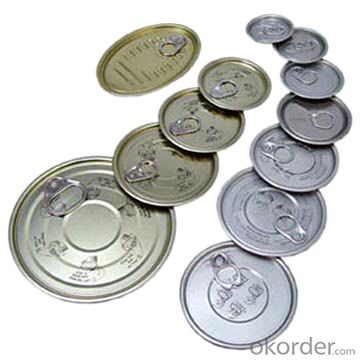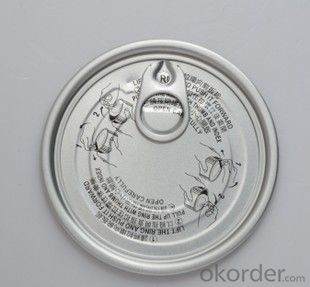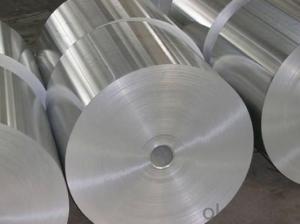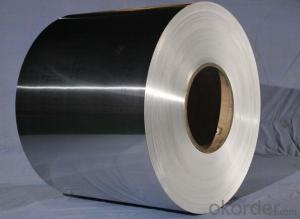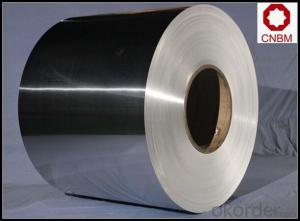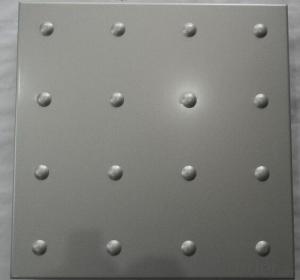Mill Finished Aluminium Coil for Can End
- Loading Port:
- China main port
- Payment Terms:
- TT or LC
- Min Order Qty:
- 100000 PCS
- Supply Capability:
- 10000000 PCS/month
OKorder Service Pledge
OKorder Financial Service
You Might Also Like
Specification
1.Specification
ALLOY:AA5182,AA5052
TEMPER:H19, H29
THICKNESS:0.22-0.26mm
WIDTH:600-1800mm
Special specification is available on customer's requirement
2.Description
5182 and AA5052 aluminum coil is an aluminum alloy that is commonly used in the production of can end. This aluminum alloy is ideal for the production of can end materials due to its excellent formability and corrosion resistance.
3.Pictures
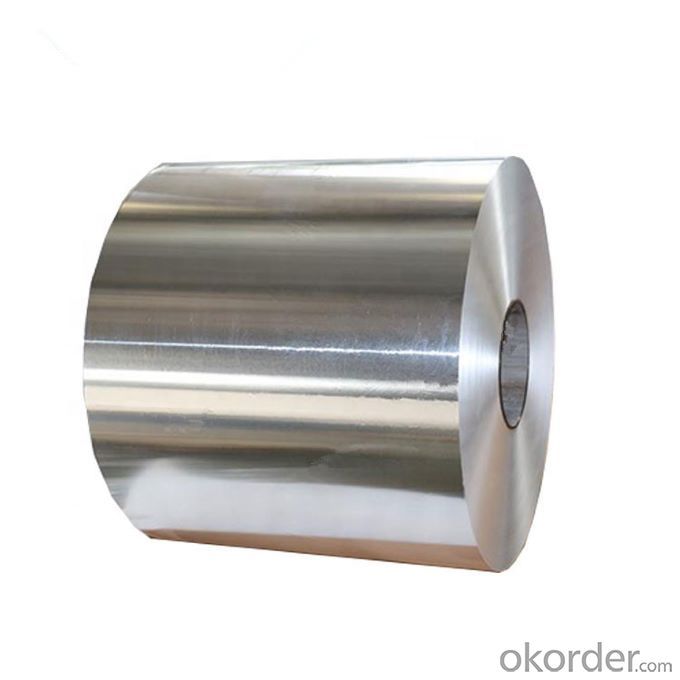
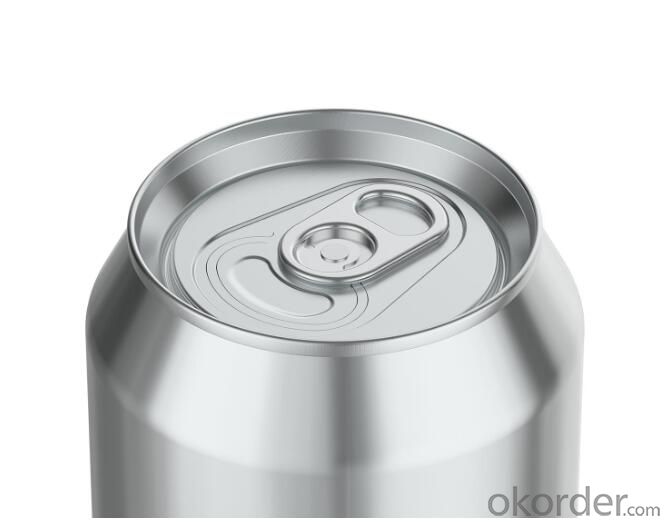
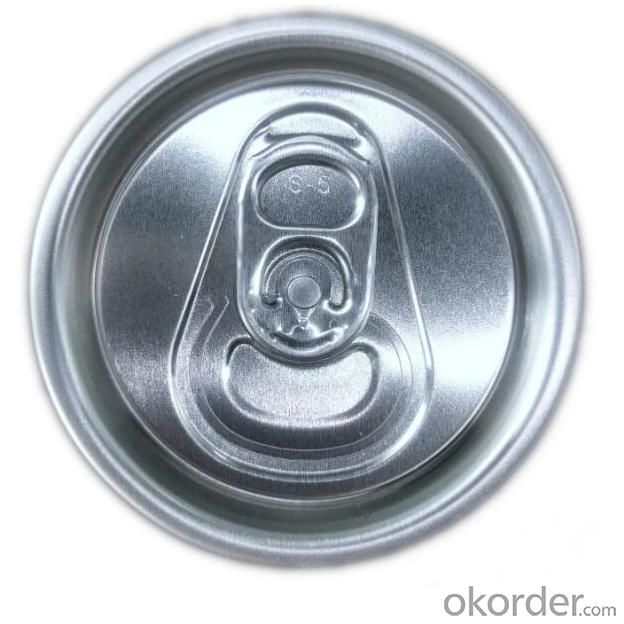
4.Professional Quality Control Team
Inspect ingot before melting
Inspecting aluminium coil /foil stock before cold rolling
Inspecting finished goods before package
Inspecting package, loading before shipment
5.Certificates
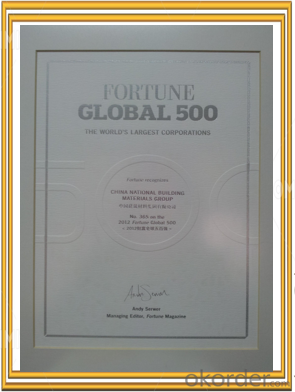
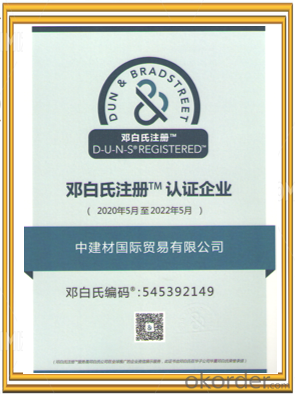
- Q: I would like to know why the ionic substance aluminium oxide doesn't dissolve in water.
- Aluminium gives away 3 electrons, and two aluminium atoms are combined with 3 oxygen atoms, the charge is just to great for it to gracefully dissolve.
- Q: the ingredient on the back says aluminum?also ..what is sodium benzoate?Is all this stuff that terrible for you? Or does it mean something else?
- i have no idea why aluminum would be in pancake mix, but i know for sure that sodium benzonate is a preservative and it is bad for you
- Q: What is the weight of an average aluminum coil?
- The weight of an average aluminum coil can vary depending on its size and thickness. However, as a general estimate, a standard aluminum coil with a thickness of 0.5mm to 1.5mm typically weighs around 1 to 3 tons. It is important to note that this is just an approximation and the actual weight can be higher or lower depending on the specific dimensions and properties of the coil.
- Q: How much cube is the 0.9mm aluminum rolling?
- This is a common problem. Anyone who had received high school education can calculate it very quickily. One way is to calculate sectional area with circular area, then times the thickness of the aluminum rolling. Another way is to use the outer diameter circular area to subtract the core area and then times the thickness of aluminum rolling.
- Q: What are the environmental effects of utilizing aluminum coil?
- <p>Aluminum coil usage has several environmental impacts. While aluminum is recyclable and has a lower carbon footprint than some other metals, its production requires significant energy, leading to CO2 emissions. The mining and refining processes can also lead to habitat destruction and water pollution. However, its lightweight nature can reduce fuel consumption in transportation, mitigating some environmental effects. The recycling of aluminum saves energy and reduces waste, making it a more sustainable choice over time.</p>
- Q: What are the surface treatment options for aluminum coils?
- There are multiple choices when it comes to surface treatments for aluminum coils, depending on specific needs and desired outcomes. Some commonly used options are as follows: 1. Anodizing: This widely utilized method involves the creation of a protective oxide layer on the surface of the aluminum coil. Anodizing offers corrosion resistance, improved durability, and the ability to customize colors with dyes. 2. Painting: Various types of paint can be applied to aluminum coils to enhance their appearance, provide extra protection against corrosion, and increase resistance to UV radiation. Both liquid and powder coatings are available, offering different finishes and levels of durability. 3. Coil coating: This treatment is a continuous process where a coating material is applied to the surface of the aluminum coil. The coil is then cured, resulting in a uniform and long-lasting coating. This option provides a wide range of finishes, colors, and special effects. 4. Laminating: By applying a protective film or sheet onto the aluminum coil's surface, laminating can enhance its resistance to scratches, abrasion, and chemicals. This treatment is commonly used in applications where the coil may encounter harsh environments. 5. Brushing or polishing: These mechanical treatments can give the aluminum coil the desired texture, such as a brushed or mirror-like finish. Brushing creates parallel lines, while polishing results in a highly reflective and smooth surface. 6. Chemical conversion coatings: Typically used as a pre-treatment before painting or as a standalone treatment, these coatings enhance corrosion resistance and provide a base for subsequent coatings like paint or powder coating. These examples demonstrate the range of surface treatment options available for aluminum coils. The choice of treatment will depend on factors such as desired appearance, level of corrosion resistance, durability, and specific application requirements.
- Q: This question asks about the environmental impact of aluminum coils, which are commonly used in various industries.
- <p>Aluminum coils have both positive and negative environmental impacts. On the positive side, aluminum is highly recyclable, and its use in coils reduces the need for raw material extraction, thus conserving natural resources. The recycling process also consumes less energy compared to primary aluminum production, reducing greenhouse gas emissions. However, the production of aluminum coils involves energy-intensive processes that can contribute to carbon emissions. Additionally, if not properly managed, the waste from aluminum production can pollute water bodies and soil. Overall, the environmental impact depends on the balance between recycling and production practices, as well as waste management.</p>
- Q: Can aluminum coils be used in food packaging?
- Yes, aluminum coils can be used in food packaging. Aluminum is a safe and versatile material that has been widely used in the food packaging industry for many years. It offers various benefits such as being lightweight, resistant to corrosion, and having excellent thermal conductivity. These properties make it ideal for food packaging applications where it is important to preserve the quality, freshness, and safety of the food products. Aluminum coils can be easily formed into different shapes and sizes, allowing for customized packaging solutions. Additionally, aluminum is a sustainable material as it is 100% recyclable, which further enhances its appeal for food packaging.
- Q: How are aluminum coils manufactured?
- Aluminum coils are manufactured through a process known as aluminum coil rolling. This process involves several steps that transform aluminum ingots into coils of various sizes and thicknesses. The first step in manufacturing aluminum coils is aluminum smelting, where raw aluminum ore is extracted and refined into aluminum ingots. These ingots are then heated in a furnace to a specific temperature, where they become malleable and ready for the rolling process. The second step is hot rolling, where the heated aluminum ingots are passed through a series of rolling mills. These mills apply pressure to the ingots, gradually reducing their thickness and increasing their length. The aluminum ingots are rolled back and forth between multiple rollers to achieve the desired thickness and shape. This process also helps to improve the mechanical properties and surface finish of the aluminum. After hot rolling, the aluminum coils undergo a process called cold rolling. In this step, the coils are further reduced in thickness using a series of cold rolling mills. Cold rolling improves the dimensional accuracy, surface finish, and mechanical properties of the aluminum. It also helps to enhance the strength and hardness of the material. Once the desired thickness is achieved, the aluminum coils may undergo additional processes such as annealing or tempering. Annealing involves heating the coils and then slowly cooling them to relieve internal stresses and improve their ductility. Tempering, on the other hand, involves reheating the coils to a specific temperature and then rapidly cooling them to enhance their strength and hardness. After these processes, the aluminum coils are usually inspected for quality control purposes. They are checked for any defects, such as surface imperfections or thickness variations, and any necessary corrections are made. Finally, the aluminum coils are typically cut into smaller sizes and packaged for distribution to various industries that use them for different applications, such as in the manufacturing of automobiles, appliances, construction materials, and packaging. In conclusion, the manufacturing of aluminum coils involves processes such as smelting, hot rolling, cold rolling, annealing, tempering, and quality control checks. These steps ensure that the aluminum coils meet the required specifications in terms of thickness, strength, and surface finish.
- Q: How are aluminum coils used in the production of marine vessels?
- Due to their unique properties and advantages, aluminum coils find extensive use in the production of marine vessels. To begin with, the lightweight nature of aluminum sets it apart from other commonly used metals like steel in shipbuilding. This quality makes it an ideal material for constructing marine vessels as it reduces the overall weight of the ship, enabling it to float more effortlessly in water. Incorporating aluminum coils into the construction process ensures that the vessel remains buoyant while maintaining its structural integrity. Furthermore, aluminum exhibits exceptional resistance to corrosion, particularly in saltwater environments. Given that marine vessels are constantly exposed to water, which can be corrosive and detrimental to metal components, the utilization of aluminum coils allows shipbuilders to minimize the risk of corrosion and enhance the longevity of the vessel. In addition, aluminum coils possess excellent thermal conductivity. This attribute is of utmost importance in marine vessels as it aids in the dissipation of heat generated by engines, machinery, and equipment, thereby ensuring the efficient and safe operation of the ship. Moreover, the malleability and adaptability of aluminum coils make them easy to form, shape, and weld, rendering them highly versatile for various shipbuilding requirements. This flexibility empowers shipbuilders to create intricate and streamlined designs, optimizing the performance and fuel efficiency of the vessel. Furthermore, the recyclability of aluminum coils makes them environmentally friendly, as they can be recycled completely, thereby reducing the carbon footprint associated with marine vessel production. This aspect aligns with the increasing demand for sustainable and eco-friendly shipbuilding practices. In conclusion, aluminum coils occupy a crucial role in the production of marine vessels. Their lightweight nature, corrosion resistance, thermal conductivity, malleability, and recyclability make them a perfect choice for shipbuilders. By incorporating aluminum coils, marine vessels can be constructed to be more efficient, durable, and environmentally friendly.
Send your message to us
Mill Finished Aluminium Coil for Can End
- Loading Port:
- China main port
- Payment Terms:
- TT or LC
- Min Order Qty:
- 100000 PCS
- Supply Capability:
- 10000000 PCS/month
OKorder Service Pledge
OKorder Financial Service
Similar products
Hot products
Hot Searches
Related keywords
